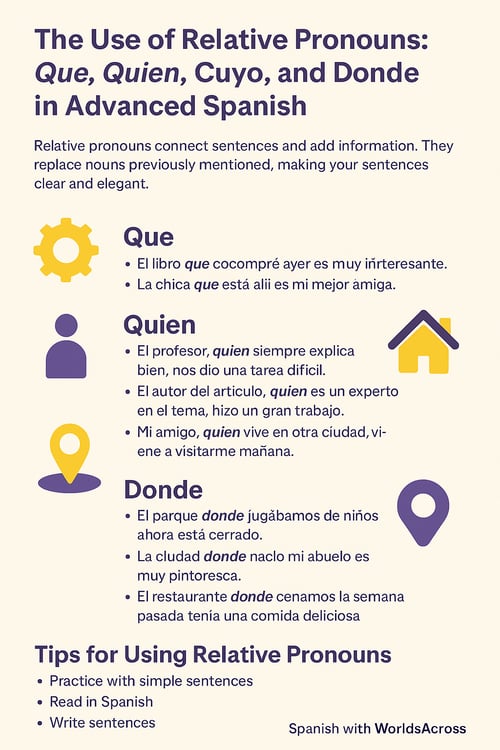Advanced Spanish: The Use of Relative Pronouns

Have you ever wondered what stands out in conversations among Spanish speakers? Certainly, there are many elements, but one of the most noticeable is the fluidity in communicating an idea. If you want to express yourself with style and fluency, learning to use relative pronouns can help. We are here to teach you how to do it.
In this article, we will explore the relative pronouns in Spanish: “que” (that), “quien” (who), “cuyo” (whose), and “donde” (where).
These are essential to sound like a true Spanish speaker.
What are Relative Pronouns?
Relative pronouns are words that connect sentences and add information. They allow us to replace a noun previously mentioned in the text. This helps avoid unnecessary repetitions and makes our sentences clearer and more elegant. Mastering relative pronouns in Spanish is crucial for expressing complex ideas naturally.
Let's get to know them!
-
“Que”
The relative pronoun “que” is used to refer to people, animals, or things, and acts as a connector between a main sentence and a subordinate sentence. It is used to introduce a subordinate clause that expands or specifies the information contained in the main sentence.
Examples:
- El libro que compré ayer es muy interesante.
- La chica que está allí es mi mejor amiga.
- La película que vimos anoche fue excelente.
-
“Quien”
The relative pronoun “quien” is used to refer to people. For example, “María, quien es mi mejor amiga, siempre me ayuda con mis tareas.” In this sentence, "quien" provides additional information about María. It is an elegant and practical way to avoid repeating names or nouns.
Examples:
- El profesor, quien siempre explica bien, nos dio una tarea difícil.
- El autor del artículo, quien es un experto en el tema, hizo un gran trabajo.
- Mi amigo, quien vive en otra ciudad, viene a visitarme mañana.
-
“Cuyo”
The relative pronoun “cuyo” indicates possession and is used to connect two related ideas. For example, “El autor, cuyo libro ganó un premio, es muy famoso.” In this case, “cuyo” connects the author with his book. Using it correctly can significantly improve your fluency in Spanish.
Examples:
- La empresa, cuyo dueño es muy amable, ha crecido mucho.
- Conocí a una familia, cuyo hijo estudia en la misma universidad que yo.
- El hombre, cuyo perro se perdió, está buscándolo desesperadamente.
-
“Donde”
The relative pronoun “donde” refers to places. For example, "La ciudad donde nací es muy pequeña." Here, “donde” tells us something more about the city.
Examples:
- El parque donde jugábamos de niños ahora está cerrado.
- La ciudad donde nació mi abuelo es muy pintoresca.
- El restaurante donde cenamos la semana pasada tenía una comida deliciosa.
These examples show how relative pronouns can enrich your sentences. Moreover, they make your communication more precise and varied.

Tips for Using Relative Pronouns
- Practice with simple sentences: Start with short sentences to get used to using relative pronouns.
- Read in Spanish: Reading books and articles in Spanish will help you see how they are used in real contexts.
- Write sentences: Writing your own sentences using relative pronouns will reinforce your understanding.
- Listen attentively: Pay attention to conversations and programs in Spanish to hear how these pronouns are used.
- Seek feedback: Ask a native speaker or tutor to review your exercises and provide feedback on the proper use of relative pronouns. This will help you identify and correct potential errors.
Achieve Fluency with Relative Pronouns
Mastering relative pronouns is essential for speaking and writing in advanced Spanish. These words allow you to connect ideas and provide details without repeating terms. Furthermore, they show a level of linguistic competence that will impress your interlocutors.
Spanish is a rich and beautiful language, full of nuances and unique expressions. Learning relative pronouns in Spanish will bring you closer to a deeper understanding of the language. We invite you to continue exploring and practicing. Every step you take brings you closer to fluency!
Remember, “Practice isn’t the thing you do once you’re good. It’s the thing you do that makes you good.” — Malcolm Gladwell. So don’t hesitate to use relative pronouns in your daily conversations. Over time, it will become more and more natural!




